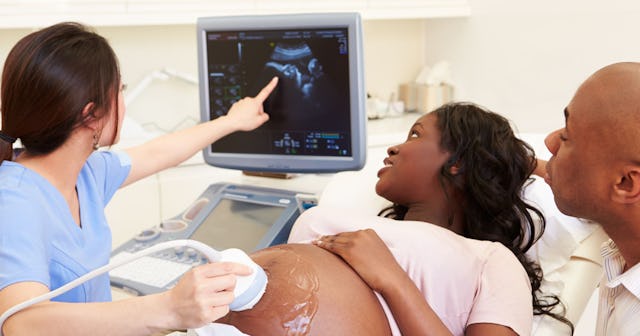Superfetation: Becoming Pregnant While Already Pregnant — HUH?

So, imagine you’ve recently learned you’re pregnant, and you’re beyond excited about it. It’s something that for years you’ve been desperately wanting and planning for. You confirmed the pregnancy weeks ago with your doctor, and afterward went out and bought onesies. You browsed the web for cribs, swings, car seats. You’re saving ideas for the nursery. All the usual first-timer excitement.
RELATED: The Best Twin Car Seats For Towing Two Around Town
Now it’s time for your 12-week ultrasound. The tech’s face goes suddenly blank as she stares at the image on the screen, and at first you panic thinking something is wrong with the baby. But then the tech tells you she’s found another baby in your uterus.
At first, your doctor is embarrassed, thinking he somehow managed to miss that you were pregnant with twins. But, upon further examination, that’s not what you’re dealing with. You are just pregnant … again. Not with twins, or, not twins the way we normally think of twins. Two separate pregnancies, several weeks apart, each managed to implant, and each are growing. You’re pregnant with superfetation twins.
A “Quite Extraordinary Pregnancy”
FilippoBacci/Getty
That’s almost exactly what happened to Rebecca Roberts, a woman from Wiltshire, England who had been trying for years with her partner Rhys Weaver to get pregnant. At 39 years old, she’d gone on fertility medication in hopes to help her get pregnant, and then got pregnant twice, three weeks apart.
Superfetation is an extremely rare occurrence, so rare that only a few cases have been documented in the scientific literature. That’s why Roberts’s doctor at first assumed they’d made a mistake and missed that she was having twins. They noted a three-week size difference between the two babies and didn’t know what to make of it. Roberts’s doctor, David Walker, an OBGYN at Royal United Hospital in Bath, told Good Morning America, “My initial reaction was, how had I missed the second twin? And following this [I] was slightly relieved that it was not my mistake but a quite extraordinary pregnancy.”
How does superfetation happen?
Superfetation happens when a second, separate pregnancy implants days or even weeks after the first. It requires that the ovaries produce two separate eggs on two different days, each independently fertilized and implanted. Superfetation can be difficult to diagnose, as it’s typically first noticed as a distinct size difference between the two fetuses, which can be explained by other factors.
Superfetation is incredibly rare because upon pregnancy, the body undergoes multiple changes that would normally prevent additional pregnancies from occurring. Hormonal shifts halt further ovulation, preventing the ovaries from releasing additional eggs, changes in the uterine lining make it difficult for new fertilized eggs to implant, and the body produces a mucus plug which seals up the cervix, making it extremely difficult for new sperm to pass.
For Roberts, with the second twin measuring at three weeks younger than the first pregnancy, the gap between pregnancies is the largest documented so far. And her pregnancy definitely came with some risks. Doctors even told her and her partner that the younger twin, whom they’d named Rosalie, may not survive.
Beating The Odds
vadimguzhva/Getty
“It wasn’t all happy and rainbows like you expect a pregnancy to be. It was quite scary,” Roberts told Good Morning America. “With twins it’s scary already and then because of my age and the fact that they were conceived at different points, and then we were told that all the odds were against Rosalie.”
Indeed, at 33 weeks, doctors had to induce Roberts to go into labor because Rosalie had stopped developing as a result of a complication with her umbilical cord. In September of last year, Roberts gave birth to both babies; Noah, a boy weighing in at 4 pounds, 10 ounces, and Rosalie, who weighed only 2 pounds, 7 ounces. “She was only a 30-week gestation baby who hadn’t grown properly at the end,” Roberts told Good Morning America. “Her placenta never really grew properly.”
For the next 95 days, Rosalie was cared for in a specialized neo-natal intensive care unit (NICU). Her brother Noah spent a little over three weeks at a separate NICU. It was nearly Christmas by the time the whole family was able to be reunited — when little Rosalie was finally able to come home.
Roberts noted that Noah and Rosalie already share an incredible bond. “When we lay them down next to each other, it’s like they instantly know and they reach out and touch each other’s faces and it’s just the most beautiful thing,” she told Good Morning America. “Twins have an amazing bond anyways but the story between these two, when they’re old enough to find out, they’ll feel even more special.”
Roberts says she calls Noah and Rosalie her “super twins.” She told Good Morning America, “Every day I look at them and think, ‘Wow, I’m so lucky.’”
Little Rosalie is healthy and growing, about to catch up to her older brother in size.
This article was originally published on